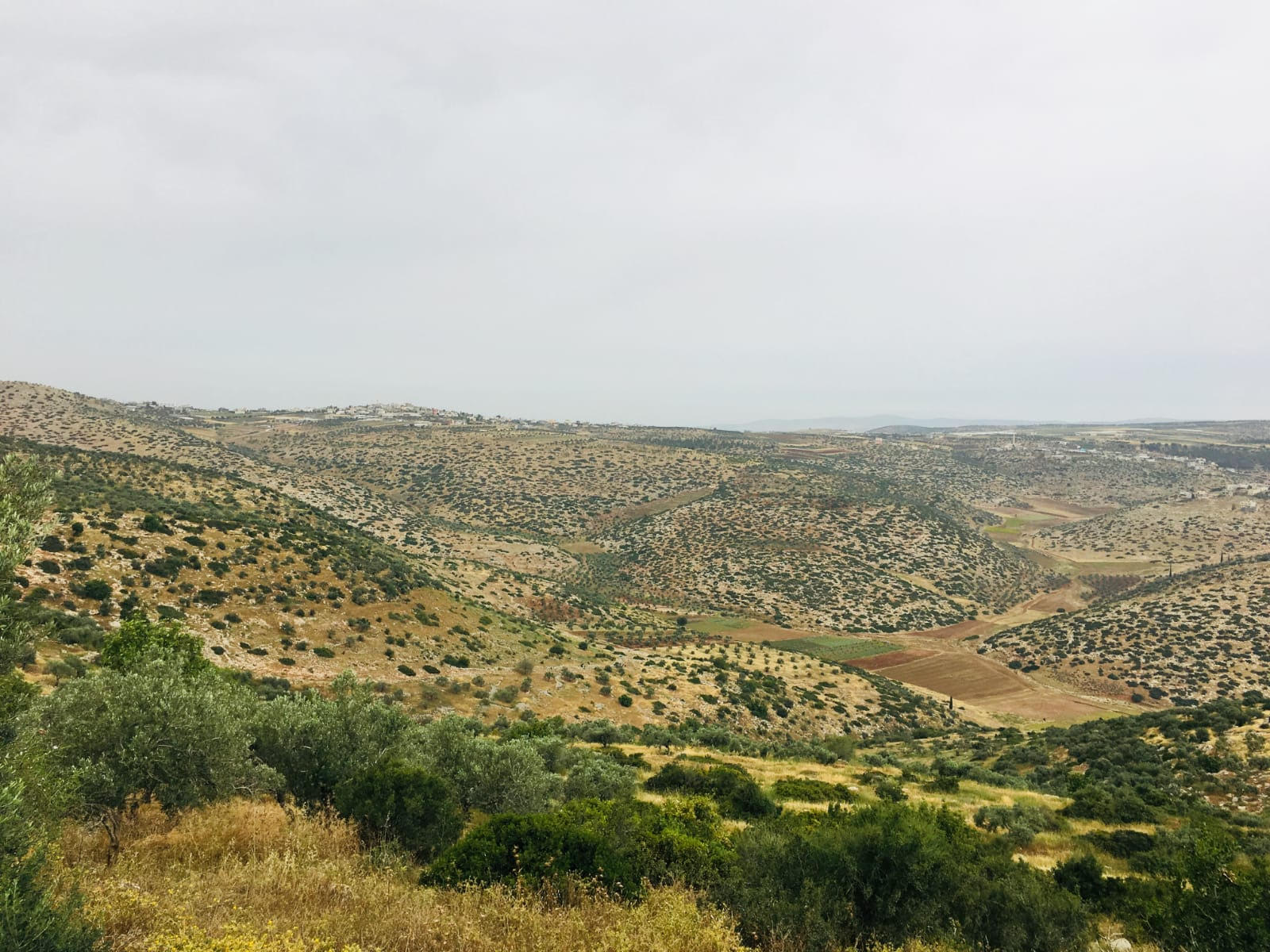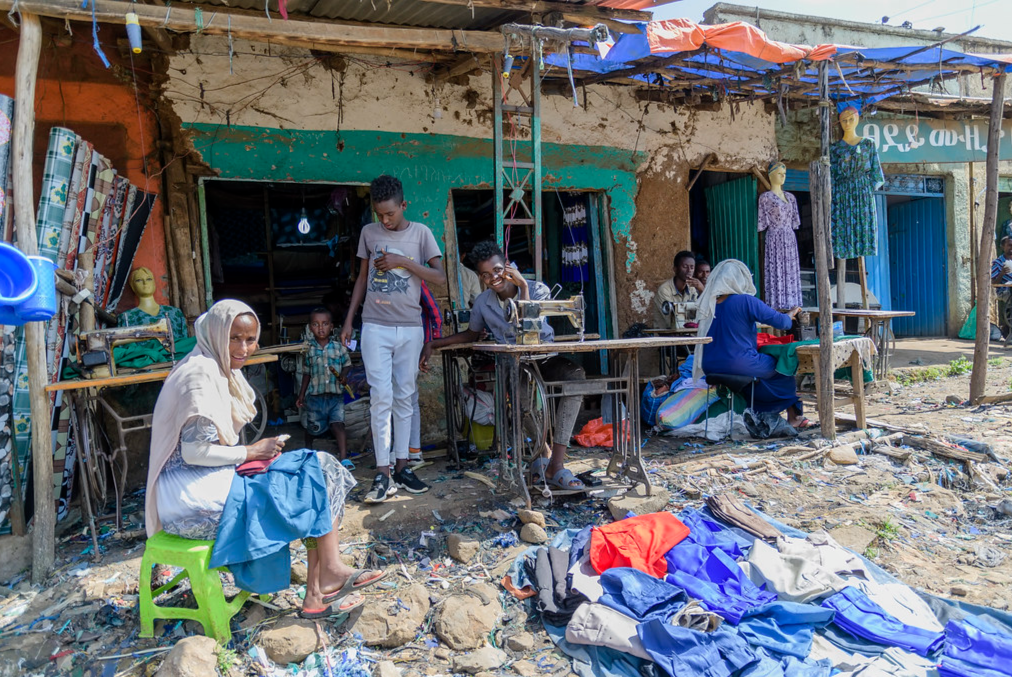The 48th Session of the Human Rights Council
(13 September- 8 October)
ITEM 3 – Promotion and protection of all human rights, civil, political, economic, social, and cultural rights, including the right to development
Interactive Dialogue with the Special Rapporteur on the promotion of Truth, Justice, Reparations, and Guarantees of Non-recurrence
16 September
By: Marc Gancedo/GICJ
Executive summary
Transitional Justice is the process whereby judiciary and non-judiciary measures are taken to ensure a peaceful transition conducive to reconciliation following a period of social conflict.
The report of the Special Rapporteur on the promotion of Truth, Justice, Reparations, and Guarantees of non-recurrence focused on the issue of accountability. The report stresses the need for taking a comprehensive, holistic approach when tackling transitional justice that is not just limited to criminal justice. Moreover, it insists that states are responsible for carrying out pertinent investigations in cases of violations of human rights. In no case will they be allowed to utilize the national legal framework to evade responsibilities. Victims must take a pivotal role, and all measures taken must have the wellbeing of those affected by human rights violations at the top of their agenda. The report also sheds light on the need for greater cooperation between national and international judicial mechanisms so that their actions are coordinated, and neither body is hampered by the measures of the other.
On the 16th of September of 2021, the Special Rapporteur, Mr. Fabián Salvioli, took the floor and presented his report to the stakeholders opening an interactive dialogue under item 3 of the agenda. In his opening statement, he reiterated several of the points made in the report. On the need to take complementary non-judiciary measures parallel to the criminal prosecution, he insisted that the pursuit of peace should not be detrimental to the pursuit of justice and that victims should not have to choose between one or the other. The general attitude of the intervening delegations was one of commitment to transitional justice providing special attention to transitional justice mechanisms and the capacity building of these. The centrality of victims during the process was a recurrent theme, as was the need to take a holistic approach that considers all aspects and is inclusive to all parts involved. Support notwithstanding, a few delegations spoke out against some of the points raised by the Special Rapporteur concerning the need for national mechanisms to adjust to international standards.
GICJ welcomes Mr. Salvioli’s insistence on including memory as the fifth pillar of Transitional Justice, an element that has been historically overlooked in processes across the world. We underscore the urgency of adopting an inclusive victim-centered approach to ensure reconciliation.
Background
Transitional Justice consists of both judicial and non-judicial mechanisms, including prosecution initiatives, reparations, truth-seeking, among institutional reform, and other alternative measures, which are directed towards a restorative justice that aims to establish a long-lasting peace following a period of conflict.
The Office of the High Commissioner for Human Rights stands as the leading entity within the United Nations System in transitional justice. It has been assisting in developing rule of law tools and aiding in the design and implementation of transitional justice mechanisms. In September 2011, the Human Rights Council adopted resolution 18/7 (renewed in 2020 in resolution 45/10) to appoint, for three years, a Special Rapporteur on the promotion of truth, justice, reparation, and guarantees of non-recurrence. The Special Rapporteur deals with situations of transition from conflict or authoritarian rule in which there have been gross violations of human rights and serious violations of international humanitarian law.
Report of the Special Rapporteur
The latest report issued by Special Rapporteur Fabián Salvioli was a thematic report titled ‘Accountability: Prosecuting and punishing gross violations of human rights and serious violations of international humanitarian law in the context of transitional justice processes. In said report, Fabián Salvioli thoroughly lists the activities undertaken between July 2020 and June 2021 and examines the obligation of states to prosecute and punish persons who bear responsibility for gross violations of human rights when countries undergo transitional justice processes.
The Report starts by pointing out the difficulties that the Special Rapporteur was faced with in fulfilling his duties due to the current health situation in the world, which forced him to postpone official visits to Bosnia and Herzegovina, Croatia, the Republic of Korea, and Serbia. Instead, he redirected his efforts to the assessment of the implementation of the recommendations made by his predecessor concerning Burundi, Spain, Sri Lanka, Tunisia, the United Kingdom of Great Britain and Northern Ireland, and Uruguay.
The Report then underscores the legacy of impunity left since the end of the Nuremberg Trial, in a period in which between 85 and 170 million people have died as a result of armed conflict. This impunity is often a result of political realities and social conflict that push for the end of armed conflicts and ensure democratic transitions rapidly without guaranteeing accountability during this process.
Next, the report emphasizes that criminal justice alone falls short to satisfy the justice claims of victims of massive or systematic human rights abuse in any transitional justice process. Other complementary non-judicial measures must be adopted so that states need not choose between truth and justice.
Furthermore, multiple legal instruments as well as customary international law, establish the obligation of States to investigate, prosecute and punish persons responsible for gross violations of human rights or severe violations of international humanitarian law with appropriate penalties. The penalties imposed for crimes against humanity, as conveyed in international human rights law, must be commensurate with the gravity of the crimes committed and hence demand the most severe penalties. Thus, the Special Rapporteur notes that impunity may arise should sanctions not be proportional to the gravity of the crimes perpetrated.
Regarding the challenges and obstacles to accountability for these crimes, the Report notes that only a small part of those responsible for international crimes or crimes against humanity are subject to criminal investigations due to the limited capacity and will of human and financial resources.
Impunity de jure
Next, the Special Rapporteur sheds light on the impunity de jure arising from the measures taken by states. First, he lists several countries that have promulgated amnesty laws that barred criminal investigations when they embarked on transitional justice processes to facilitate political settlements. In some cases, like South Africa, justice was traded for truth, other countries were less lucky, and neither was achieved. Furthermore, some states have resorted to legal provisions such as statutory limitations or non-retroactivity provisions to prevent the investigation and punishment of these crimes despite them not being subject to limitation. In other countries, legal problems arise due to the lack of a legal definition of such offenses in the Criminal Code. Also, it is pointed out that even though imminent terminal illnesses may allow pardons, physical and mental deterioration resulting exclusively from age cannot grant such benefits.
Impunity de facto
Impunity can also arise even if transitional justice mechanisms conducive to justice and truth are adopted. The pressure and intimidation faced by prosecutors and judges and the structural prejudice and inequality on minorities give rise to impunity. In other cases, like Uganda, Gambia, and Colombia, the sheer number of cases under investigation surpass the capacity of judicial bodies, who are faced with constant operational challenges.
Good practices and lessons learned
The Special Rapporteur notes that despite not having legally defined certain international crimes, such crimes are covered in the criminal codes or special legislation in most states.
More states have decided to take measures leading to the revocation of amnesties or making them unconstitutional, thus preventing the legislature from obstructing proper accountability processes.
Furthermore, the report also notes the improvement of institutional capacities that have enabled more extensive participation of civil society and the centrality of victims in transitional justice processes.
Furthermore, there has been a greater investment in national judicial systems and their cooperation with the international system. The good relations between national and international jurisdictions helps combat impunity. On that note, the principle of universal jurisdiction has been incorporated into many national normative frameworks. Nonetheless, some states continue to refrain from applying international standards and often rely on their national legal framework to escape with impunity in spite of standing international law.
The report ended with 12 conclusions and several other recommendations. From these, we underscore “the need to embrace a holistic process for upholding the five pillars of transitional justice – truth, justice, reparation, guarantees of non-repetition and memorialization.”
Latest country reports: during the Interactive Dialogue, the Special Rapporteur also noted the follow-up country reports, which we summarize below.
Follow-up on the visits to Tunisia, Uruguay, and Spain
 In Tunisia, the Truth and Dignity Commission established in 2014 received 62,720 claims of human rights violations; however, due to lack of time and resources, only 205 of those claims were processed and transferred to the 13 specialized criminal chambers. The Commission faced during its mandate continuous procedural and political obstacles suggesting a lack of will to carry out a comprehensive transitional justice process. Moreover, the SR also notes the lack of clarity regarding the applicable body of law criminalizing certain offenses that fall within the jurisdiction of the special criminal chambers, as set out in Organic Law No. 53, but that has not been adequately integrated into the criminal legal framework. To make matters worse, Tunisian law does not recognize the gravity of crimes against humanity as defined under international criminal law. Mr. Fabián Salvioli acknowledges the relative progress made but regrets the gaps and obstacles standing in the way of meaningful accountability, reparations, and guarantees of non-recurrence.
In Tunisia, the Truth and Dignity Commission established in 2014 received 62,720 claims of human rights violations; however, due to lack of time and resources, only 205 of those claims were processed and transferred to the 13 specialized criminal chambers. The Commission faced during its mandate continuous procedural and political obstacles suggesting a lack of will to carry out a comprehensive transitional justice process. Moreover, the SR also notes the lack of clarity regarding the applicable body of law criminalizing certain offenses that fall within the jurisdiction of the special criminal chambers, as set out in Organic Law No. 53, but that has not been adequately integrated into the criminal legal framework. To make matters worse, Tunisian law does not recognize the gravity of crimes against humanity as defined under international criminal law. Mr. Fabián Salvioli acknowledges the relative progress made but regrets the gaps and obstacles standing in the way of meaningful accountability, reparations, and guarantees of non-recurrence.

In regards to Uruguay, the report points out the promising reforms adopted in various areas of transitional justice but regrets the lack of implementation of key recommendations. Uruguay took measures directed on accountability by establishing the Attorney’s General Office as an autonomous institution which then established a specialized office to prosecute crimes against humanity. This measure notwithstanding, the Special Rapporteur expresses his concern on the legacy of the 1986 Act on the Expiry of the Punitive Claims of the State (Expiry Act) as it continues to be a source of de facto impunity. Moreover, the need to adopt a comprehensive reparation programme is made aware. Finally, the SR commends Uruguay for the meaningful steps taken in matters of memorialization and strengthening the independence and integrity of the judiciary.
 Finally, the report provides a great length of detail on the case of Spain. The Special Rapporteur stresses the fact that many of the challenges analysed in the report of 2014 persist. The victims of the civil war and the dictatorship continue to be denied their rights to truth, justice, full reparation, memory, and guarantees of non-recurrence. This is a direct result of the continued application of the 1977 amnesty law and statutes of limitations by national courts, which continue dismissing such allegations even though this is contrary to Spain’s human rights obligations and international standards. Thus, the SR recommends that the law be repealed and bring its laws to be in accordance with the international framework. Despite the continued efforts, the SR shares its optimism on the creation of a State Secretariat for Democratic Memory tasked to ensure State leadership in public policy on the preservation and promotion of democratic memory and the bill on democratic memory, which could address many of the concerns raised in the report. The SR also welcomes the recent increase in the budget allocated to municipalities and communities for exhumations and the redesignation of the ‘Valle de los Caídos’ following the exhumation of Franco. Finally, the SR celebrates the efforts made by the current government but remains troubled by the prospect that partisan interests and party politics might awaken social divisiveness that ultimately could endanger the adoption of an effective transitional justice strategy in compliance with human rights standards.
Finally, the report provides a great length of detail on the case of Spain. The Special Rapporteur stresses the fact that many of the challenges analysed in the report of 2014 persist. The victims of the civil war and the dictatorship continue to be denied their rights to truth, justice, full reparation, memory, and guarantees of non-recurrence. This is a direct result of the continued application of the 1977 amnesty law and statutes of limitations by national courts, which continue dismissing such allegations even though this is contrary to Spain’s human rights obligations and international standards. Thus, the SR recommends that the law be repealed and bring its laws to be in accordance with the international framework. Despite the continued efforts, the SR shares its optimism on the creation of a State Secretariat for Democratic Memory tasked to ensure State leadership in public policy on the preservation and promotion of democratic memory and the bill on democratic memory, which could address many of the concerns raised in the report. The SR also welcomes the recent increase in the budget allocated to municipalities and communities for exhumations and the redesignation of the ‘Valle de los Caídos’ following the exhumation of Franco. Finally, the SR celebrates the efforts made by the current government but remains troubled by the prospect that partisan interests and party politics might awaken social divisiveness that ultimately could endanger the adoption of an effective transitional justice strategy in compliance with human rights standards.
Follow-up on the visits to Burundi, the United Kingdom of Great Britain and Northern Ireland, and Sri Lanka
 In the case of Burundi, the SR notes the pervasive impunity and lack of accountability arising from the lack of independent investigations. The Commission of Inquiry determined that gross and systematic human rights violations perpetrated in Burundi primarily by State agents since April 2015. Furthermore, in 2018, the Government revised the mandate of the Truth and Reconciliation Commission to cover the colonial period. In 2019, the Commission reported that 142,505 Burundians had been killed or had gone missing from the time of independence in 1962 to the end of the civil war in December 2008. The objectivity of the Commission came under fire for focusing mainly on the excavation of sites known to have been members of the Hutu ethnic group. The Special Rapporteur makes note of the progress made on the exhumations but ultimately regrets the failure to make headway on other aspects of the transitional justice agenda.
In the case of Burundi, the SR notes the pervasive impunity and lack of accountability arising from the lack of independent investigations. The Commission of Inquiry determined that gross and systematic human rights violations perpetrated in Burundi primarily by State agents since April 2015. Furthermore, in 2018, the Government revised the mandate of the Truth and Reconciliation Commission to cover the colonial period. In 2019, the Commission reported that 142,505 Burundians had been killed or had gone missing from the time of independence in 1962 to the end of the civil war in December 2008. The objectivity of the Commission came under fire for focusing mainly on the excavation of sites known to have been members of the Hutu ethnic group. The Special Rapporteur makes note of the progress made on the exhumations but ultimately regrets the failure to make headway on other aspects of the transitional justice agenda.
 Following up on the events of the United Kingdom of Great Britain and Northern Ireland, the report outlines the four institutions arising from the 2014 agreement for dealing with the violent period commonly referred to as “the Troubles”. Despite the measures taken, following the change of government in the UK in 2020, a new approach has been taken. It represents a significant departure from the previous deal in regard to access to justice for the families of persons killed in connection with the Troubles, as sharing information is favoured over accountability. The SR asserts that the “legacy package” introduced this year, which focused on information recovery and reconciliation and ending the “cycle of investigations”, would ban prosecutions under a statute of limitations, end criminal cases and investigations and preclude claims in civil courts. Mr. Fabián Salvioli laments the insufficient implementation of the recommendations and remains deeply concerned about the proposed plan, which would provide blanket impunity and place the United Kingdom in direct violation of its human rights obligations.
Following up on the events of the United Kingdom of Great Britain and Northern Ireland, the report outlines the four institutions arising from the 2014 agreement for dealing with the violent period commonly referred to as “the Troubles”. Despite the measures taken, following the change of government in the UK in 2020, a new approach has been taken. It represents a significant departure from the previous deal in regard to access to justice for the families of persons killed in connection with the Troubles, as sharing information is favoured over accountability. The SR asserts that the “legacy package” introduced this year, which focused on information recovery and reconciliation and ending the “cycle of investigations”, would ban prosecutions under a statute of limitations, end criminal cases and investigations and preclude claims in civil courts. Mr. Fabián Salvioli laments the insufficient implementation of the recommendations and remains deeply concerned about the proposed plan, which would provide blanket impunity and place the United Kingdom in direct violation of its human rights obligations.
 In his last follow-up report, the Special Rapporteur paints a rather sombre picture of the current situation in Sri Lanka. The transitional justice process in Sri Lanka has not just slowed down but has abruptly been brought to an end, and further violations of human rights have been committed since the new government came to power. Investigations into military and security officers linked to human rights violations have been suspended and reprisals against several members of the Criminal Investigation Department have hampered accountability.
In his last follow-up report, the Special Rapporteur paints a rather sombre picture of the current situation in Sri Lanka. The transitional justice process in Sri Lanka has not just slowed down but has abruptly been brought to an end, and further violations of human rights have been committed since the new government came to power. Investigations into military and security officers linked to human rights violations have been suspended and reprisals against several members of the Criminal Investigation Department have hampered accountability.
Furthermore, the government has halted its support for the Office on Missing Persons, has tried through judicial means to suppress memorialization efforts made by families, and has utilized security concerns to justify the threats, surveillance, and obstruction of the activities of human rights defenders. The government has not only failed to implement the recommendations made but has taken measures that directly endanger the enjoyment of human rights in Sri Lanka.
Interactive Dialogue with the Special Rapporteur
The 16th of September of 2021, at the 7th meeting of the 48th Session of the Human Rights Council, the Special Rapporteur on the promotion of Truth, Justice, Reparations, and Guarantees of non-recurrence took the floor and presented his report to the stakeholders opening an interactive dialogue under item 3 of the agenda.
Mr. Fabian Salvioli presented the report under the name “Accountability: Prosecuting and punishing gross violations of human rights and serious violations of international humanitarian law in the context of transitional justice processes,” as well multiple follow-up reports on Tunisia, Spain, Uruguay, Rwanda, Burundi, the United Kingdom, and Sri Lanka.
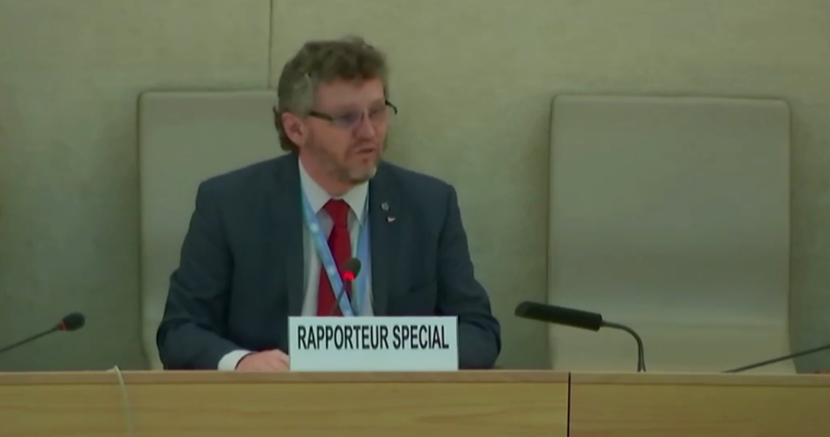 Following this presentation, he addressed the strenuous difficulties posed by the pandemic that impeded official visits, which instead were replaced by the participation in multiple activities held remotely. He used this time to follow-up on the implementation of past recommendations. He also noted that he had conducted a thematic report of how transitional justice measures tackled the grave violations of human rights committed under colonial contexts, which will be presented in the next General Assembly Session.
Following this presentation, he addressed the strenuous difficulties posed by the pandemic that impeded official visits, which instead were replaced by the participation in multiple activities held remotely. He used this time to follow-up on the implementation of past recommendations. He also noted that he had conducted a thematic report of how transitional justice measures tackled the grave violations of human rights committed under colonial contexts, which will be presented in the next General Assembly Session.
He asserted that accountability is a legal obligation of states grounded on international law, which, in turn, obliges them to investigate these crimes and give out accordingly punishments adequate to the crimes committed. Mr. Fabián Salvioli stressed the lack of uniformity in terms of the measures taken by states with some granting pardons, amnesties, statutory limitations, reduced sentences, and overall inadequate methods that ultimately lead to impunity and do not abide by international standards. On this point, he reiterated that the pursuit of peace cannot hamper the achievement of justice and pointed out that victims are often confronted with the difficult choice of choosing peace or justice but not both. In extremes cases, victims are forced to pardon perpetrators, which in turn revictimizes them.
To avoid this, Mr. Fabián Salvioli stated that any holistic approach to international justice must have all five pillars of transitional justice – truth, justice, reparations, guarantees of non-recurrence, and memory – at its foundation. Moreover, the Special Rapporteur provided an overview of the follow-up cases reported and made several comments placing special emphasis on the setback of Sri Lanka in its transitional justice process due to the deteriorating human rights situation.
In the ensuing discussion, the intervening European delegations praised the work of the Special Rapporteur, shared their commitment in the fight against impunity, reaffirmed the importance of a victims-centred approach, and presented several questions. The delegate representing the EU asked the SR to elaborate on accountability and the respect of the rule of law in the construction of fair democratic practices and sustainable peace.
 The representative from Luxembourg asked what role the UN Geneva System could have in aiding countries. Switzerland asked how the international community could enforce complementary measures and the use of technology. Switzerland’s representative also extended its concern over the situation in Sri Lanka and urged the SR to continue monitoring the events there. The French representative stressed the role of the International Criminal Court in fighting impunity and urged states to ratify the Rome Statute.
The representative from Luxembourg asked what role the UN Geneva System could have in aiding countries. Switzerland asked how the international community could enforce complementary measures and the use of technology. Switzerland’s representative also extended its concern over the situation in Sri Lanka and urged the SR to continue monitoring the events there. The French representative stressed the role of the International Criminal Court in fighting impunity and urged states to ratify the Rome Statute.
The delegates from Egypt and Cuba stood out as some of the dissenting voices in the Interactive Dialogue. The respect for national sovereignty was vindicated, implying that international legal mechanisms and standards do not supersede the standing national legal framework. Direct criticism at the work of the Special Rapporteur and his report was also drawn from a few delegations.
Russia criticised the alleged ignorance of the key milestone that was the Nuremberg Tribunal and asserted that it is unwise to overstate the value of transitional justice mechanisms as they had often been unsuccessful. The dialogue became more heated as the delegate from India questioned the knowledge of the Special Rapporteur on how the judiciary operates in India and criticised some of the observations made on India for being baseless accusations. Moreover, China and Iran took a similarly hostile approach by directing accusations of human rights violations against the United States and its allies without making any reference to the advances taken by their governments on the matter at hand.
The following intervention by the delegate from Colombia contrasted greatly with the remarks previously made as to the advances on the transitional justice process Colombia continues undergoing. Other Latino American countries like Ecuador, Uruguay, Chile, and Argentina shared their commitment to the cause asserting that states have the obligation of carrying out investigations and that in no case can they adopt judiciary dispositions conducive to impunity. Directly addressing the Special Rapporteur’s comments on the impunity that followed the end of WWII, the delegate of South Korea shed light on the case of “Comfort Women of WWII”.
In his mid-intervention, Mr. Fabián Salvioli sought to answer some of the points and questions raised. To how the international community could contribute to accountability, he claimed that a sole voice had to be adopted and that cooperation with the ICC is key. In regards to the importance of archives for accountability there is a need to homogenize the policy. Moreover, on the question raised by Togo if pardons could be granted for humanitarian reasons, the SR indicated that the report presents the criteria to be followed and that only in cases of terminal illness could pardons be granted.
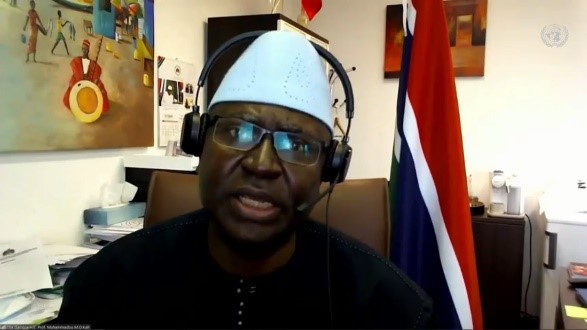
In the following interventions, the different African delegations took the spotlight. On broad terms, all shared their commitment to transitional justice agreeing on several of the points raised by the Special Rapporteur and presenting the progress made on their respective processes of transitional justice.
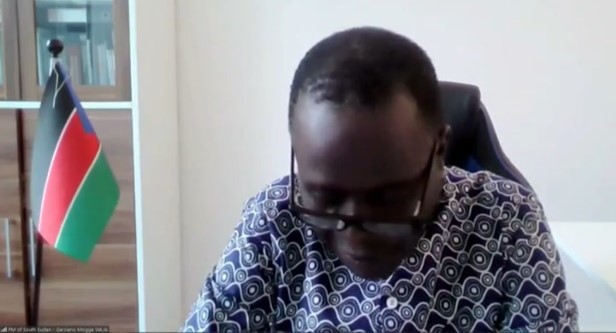
Sudan noted the Peace Agreement reached in 2020, the adoption of the law of transition, as well as the government’s cooperation with the ICC, and a memorandum of understanding. South Sudan also shared its commitment to peace and reconciliation, noting that the ministry of justice counts with a mandate for a Commission of Truth. Gambia noted the establishment of its Truth and Reconciliation Commission in 2018 and the extension of its mandate to 2021 to ensure the fulfilment of its duties. Uganda provided its own experience on the matter as proof that guarantees of non-recurrence are vital to any transitional justice process and echoed the calls for ending the abusive resort to domestic laws to avoid international obligations.
Following the interventions of country and regional representatives, civil society took the floor. The latest events concerning the measures taken by the British government received significant attention. NGOs denounced the plans to adopt amnesties and reminded the UK government of their obligations to human rights. It was also requested for this case to be further monitored by the Human Rights Council. Regarding Liberia, it was noted that no further steps had been taken to establish a War Crimes Court due to the lack of political will. Moreover, the worsening situation in the Philippines was brought forward with special attention to the historical distortions perpetuated by the current Philippines government.After the intervention of 50 delegates and 15 NGOs, the SR made his final remarks. He reiterated the key role NGOs play for the work of his mandate and took note of the suggestions to look into the violations of human rights committed by non-state actors, and announced that this would be the underlying theme of his next report. In regards to how to ensure the technical capacity of Truth Commissions and the independence of its work, it was stated that Truth Commissions must be given enough time and resources. Also, more people are needed with training on human rights and treatment of victims with a gender perspective. In his final statement, the Special Rapporteur insisted on the importance of reconciliation to restore the trust in the state and secure lasting peace that cannot be found solely through judiciary means.
Position of Geneva International Center for Justice
GICJ welcomes the report and commends the Special Rapporteur for fulfilling his duties despite the obstacles faced in light of the pandemic and the extensive activities organized in replacement of the scheduled visits. We would also like to extend our appreciation to the HRC members who manifested their commitment to transitional justice in the duration of the Interactive Dialogue. Nonetheless, we remain concerned about those countries shielding behind national legal provisions and national sovereignty to justify the lack of measures of transitional justice taken that ultimately lead to de facto impunity.
We call for states currently undergoing transitional justice processes to take a lesson from past cases. When establishing transitional justice mechanisms, states should take measures to allow Truth and Justice Commissions to fulfil their mandate and conduct their work independently without fear of political and social pressures. On this issue, we would also like to stress the need for capacity-building measures targeted at equipping the bodies involved with the necessary material, financial and human means to ensure the mandate’s completion in a timely manner and with a satisfactory outcome. Far too often, Commissions of Truth are not given enough time to complete their mandate which is why we urge those countries currently implementing such instruments to extend the mandate of the commissions if necessary.
GICJ coincides with the several remarks pointing at the need for restorative justice to be applied complementary to standard legal procedures. We welcome Mr. Salvioli’s insistence on including memory as the fifth pillar of Transitional Justice, an element that has been historically overlooked in processes across the world. We underscore the need for taking a holistic approach directed at establishing lasting peace. We believe that the only means to that end is by adopting an inclusive victim-centred approach. National reconciliation should ultimately be the final objective of any transitional justice process; however, it is unachievable through exclusively judiciary means.
Similarly, amnesties and other measures conducive to impunity cannot be adopted under the pretext of peace and reconciliation. States must confront their past to deal with their future. Failure to do so will only make social conflict and further human rights violations more likely.
Justice, Human rights, Geneva, geneva4justice, GICJ, Geneva International For Justice
Previous Reports from the 48th Session of the UN Human Rights Council






